小学英语专题讲座稿
小学英语专题讲座
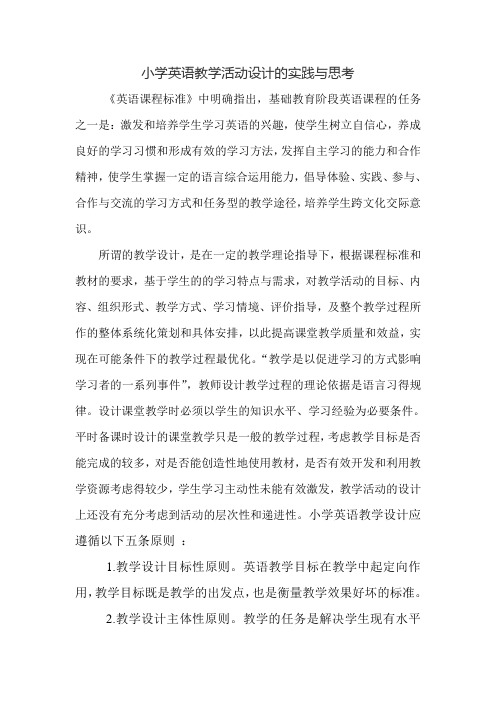
小学英语教学活动设计的实践与思考《英语课程标准》中明确指出,基础教育阶段英语课程的任务之一是:激发和培养学生学习英语的兴趣,使学生树立自信心,养成良好的学习习惯和形成有效的学习方法,发挥自主学习的能力和合作精神,使学生掌握一定的语言综合运用能力,倡导体验、实践、参与、合作与交流的学习方式和任务型的教学途径,培养学生跨文化交际意识。
所谓的教学设计,是在一定的教学理论指导下,根据课程标准和教材的要求,基于学生的的学习特点与需求,对教学活动的目标、内容、组织形式、教学方式、学习情境、评价指导,及整个教学过程所作的整体系统化策划和具体安排,以此提高课堂教学质量和效益,实现在可能条件下的教学过程最优化。
“教学是以促进学习的方式影响学习者的一系列事件”,教师设计教学过程的理论依据是语言习得规律。
设计课堂教学时必须以学生的知识水平、学习经验为必要条件。
平时备课时设计的课堂教学只是一般的教学过程,考虑教学目标是否能完成的较多,对是否能创造性地使用教材,是否有效开发和利用教学资源考虑得较少,学生学习主动性未能有效激发,教学活动的设计上还没有充分考虑到活动的层次性和递进性。
小学英语教学设计应遵循以下五条原则:1.教学设计目标性原则。
英语教学目标在教学中起定向作用,教学目标既是教学的出发点,也是衡量教学效果好坏的标准。
2.教学设计主体性原则。
教学的任务是解决学生现有水平与教育要求之间的矛盾。
小学英语教师在课堂教学中要起到调节学生与教材之间的关系的作用。
3.教学设计针对性原则。
英语的课堂教学设计针对具体教学目标和教学对象而精心制定的。
教学对象千差万别,教学内容也各有千秋,教学设计需要体现这些差异性,具有针对性。
(例如:在小学英语启蒙教学中,“交际”是进行教学的前提。
而“听”则是进行交际的前提。
)4.教学设计实践性原则。
也称为可操作性原则。
教学目标解决的是教师要"教什么"的问题,教学设计要解决的则是"如何教"的问题,更具有策略意义,更具有规划、筹划的意味,必须具有可操作性、实用性。
小学英语讲座讲稿范文

小学英语讲座讲稿范文Good morning, dear students! Today, we embark on a thrilling journey into the world of English, a language that opens doors to cultures, knowledge, and opportunities beyond our imagination. Imagine being able to communicate with friends from around the globe, or understanding the stories and ideas that have shaped the world. That's the power of English!As we delve into the basics of English, let's remember that every language starts with the ABCs. But it's not just about memorizing letters; it's about understanding how they come together to form words that paint pictures in our minds. From simple greetings like "Hello" and "Goodbye" to more complex sentences, each word is a building block in constructing meaningful conversations.But language is more than just words; it's about expression. It's about conveying emotions, sharing experiences, and telling stories. English, with its rich vocabulary and flexible grammar, offers endless ways to express yourself. Whether you're describing the beauty of a sunset or the excitement of a sports match, the right words can make all the difference.Let's also not forget the importance of listening. Being a good listener is as crucial as being a good speaker. It's through listening that we learn, understand differentperspectives, and show respect for others' ideas. So, as we practice our English, let's also practice being attentive listeners.Reading is another key component of mastering English.It's not just about decoding words on a page; it's about immersing yourself in different worlds, learning new ideas, and expanding your horizons. From classic literature to contemporary magazines, the more you read, the more you'll grow as an English speaker.And finally, let's talk about writing. Writing is a powerful tool for self-expression and communication. Itallows you to put your thoughts on paper, to create stories, and to share your unique point of view with the world.Whether it's a simple diary entry or a more formal essay, writing in English can be both a creative outlet and a meansof communication.In conclusion, learning English is an adventure filledwith discovery and growth. It's about more than just language; it's about connecting with the world. So, let's embrace this journey with curiosity, enthusiasm, and an open mind. Remember, every word you learn brings you one step closer to fluency and to a world of endless possibilities. Happy learning, and may your English be as colorful and vibrant as the world it can introduce you to!。
小学英语教师讲座讲稿
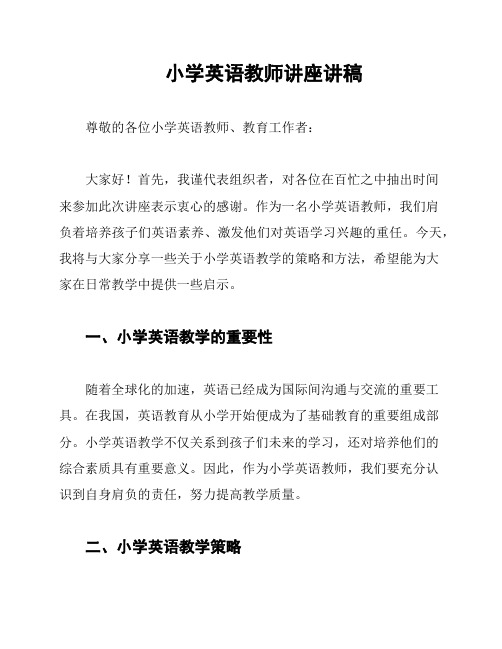
小学英语教师讲座讲稿尊敬的各位小学英语教师、教育工作者:大家好!首先,我谨代表组织者,对各位在百忙之中抽出时间来参加此次讲座表示衷心的感谢。
作为一名小学英语教师,我们肩负着培养孩子们英语素养、激发他们对英语学习兴趣的重任。
今天,我将与大家分享一些关于小学英语教学的策略和方法,希望能为大家在日常教学中提供一些启示。
一、小学英语教学的重要性随着全球化的加速,英语已经成为国际间沟通与交流的重要工具。
在我国,英语教育从小学开始便成为了基础教育的重要组成部分。
小学英语教学不仅关系到孩子们未来的学习,还对培养他们的综合素质具有重要意义。
因此,作为小学英语教师,我们要充分认识到自身肩负的责任,努力提高教学质量。
二、小学英语教学策略1. 激发学习兴趣兴趣是最好的老师。
我们要善于运用各种教学手段,如图片、实物、游戏等,让英语学习变得生动有趣,从而激发学生们的学习兴趣。
2. 注重语音教学语音是英语学习的基础,我们要重视语音教学,让学生掌握正确的发音方法,为今后的英语学习打下坚实基础。
3. 情景教学创设真实的语境,让学生在情景中自然地学习和使用英语。
例如,通过角色扮演、故事讲解等方式,让学生在实际情境中锻炼英语表达能力。
4. 差异化教学考虑到学生之间的个体差异,我们要因材施教,针对不同程度的学生制定合适的教学计划,使每个学生都能在原有基础上得到提高。
5. 鼓励合作学习鼓励学生之间进行合作学习,通过讨论、互动等形式,提高他们的团队协作能力和沟通能力。
三、教师素养提升作为一名优秀的小学英语教师,我们不仅要具备扎实的英语专业知识,还要不断提高自己的教育教学能力。
具体措施包括:1. 深入学习英语教学理论,掌握教育教学方法。
2. 参加各类教育培训,提高自己的业务水平。
3. 关注教育领域的发展动态,不断更新教育观念。
最后,希望大家能够将本次讲座的内容运用到日常教学中,努力提高小学英语教学质量,为培养具有国际竞争力的优秀人才贡献力量。
小学英语专题讲座

?总之,课堂教学的有效性是我们的永恒追求。有效课堂作为一种理念,更是一种教学实践模式。在今后的教学中我们应更多地关注、思考课堂,让教学建立在有效的基础上,使课堂更精彩。最后,借着名英语特级教师沈峰老师关于小学英语有效性教学的观点,那就是有效的英语课堂应把属于学生的东西还给学生;给学生发展的空间;关注师生的共同发展;提倡简约本真的课堂。
1、关注教材处理的有效性
叶圣陶曾说过“教材只能作为教课的依据,要教得好,使学生受到益处,还得靠教师的善于运用”。课本上的内容是固定的,但并不是说我们必须照本宣科、按部就班地去教,教师要懂得处理教材,有些内容需要我们经过一番“加工”才能带进课堂,“教师要从学生的实际出发,灵活运用教材,使教材服务于学生,而不是让学生来适应教材”。
二是在对话教学的处理上。张老师巧妙地将课文对话设计成一段阅读材料,先让学生根据问题自行阅读,再逐步讲解,从细节上把握课文,最后水到渠成地让学生进行试读、跟读。这种教学方法,也是对高年级篇章阅读教学的一个有效尝试。
2、关注课堂导入的有效性
设计课堂导入环节的目的是使新授内容与已授知识之间建立有效的联系。导入环节是否有效是决定课堂教学成败的关键。有效的导入能帮助学生整理已有的知识体系,并将其调整到适于接受新知识的状态。实际教学中,许多教师都很重视导入,方法多样,注重调动学生的学习兴趣。但在我们采取各种方法进行导入时,我们更要考虑到这种导入是否有必要是否冗长是否贴近学生的生活是否目的明确导入的作用是激活旧知或学生相关背景知识,引发学生对将要学习内容的兴趣,导入不可以喧宾夺主,耗时过长,导入所选的话题也要尽可能地贴近新授内容。张老师以Unit6这课所学的An Apple这首歌导入,由An apple a day keeps the doctor away切入,直接导入到本课的主题Seeing a doctor,这种导入简洁、迅速、使学生在轻松的课堂气氛中自然而然地进入到本课的学习内容,效果明显。
小学英语讲座交流发言稿

大家好!今天,我很荣幸能在这里与大家分享一些关于小学英语学习的心得体会。
英语作为一门国际通用语言,在我们的生活中扮演着越来越重要的角色。
今天,我想从以下几个方面来和大家交流一下小学英语学习的经验。
一、激发学习兴趣兴趣是最好的老师。
在学习英语的过程中,我们要努力激发自己对英语的兴趣。
以下是一些建议:1. 创设良好的学习氛围。
在家中,可以播放英语歌曲、观看英语动画片,让英语成为生活的一部分。
2. 参加英语角、英语俱乐部等活动,与同学们一起练习英语,提高口语表达能力。
3. 阅读英语绘本、故事书,提高阅读兴趣,拓宽词汇量。
二、培养良好的学习习惯1. 制定学习计划。
每天安排一定的时间学习英语,如背诵单词、阅读英语文章等。
2. 坚持练习听力。
可以通过收听英语广播、观看英语电影等方式,提高听力水平。
3. 多进行口语练习。
与同学、老师进行英语对话,提高口语表达能力。
4. 及时复习。
学习新知识后,要及时复习巩固,避免遗忘。
三、掌握学习方法1. 分类记忆单词。
将单词按照词性、词义进行分类,有助于提高记忆效果。
2. 学会语法。
掌握基本的语法知识,有助于提高写作和口语表达能力。
3. 利用网络资源。
通过在线课程、英语学习APP等途径,丰富学习内容,提高学习效果。
4. 重视阅读。
通过阅读英语文章,提高词汇量、阅读速度和理解能力。
四、注重实践1. 参加英语演讲、写作比赛等活动,提高英语实际运用能力。
2. 积极参加英语角、英语俱乐部等,锻炼口语表达能力。
3. 主动与外国朋友交流,提高英语沟通能力。
总结:学习英语是一个长期的过程,需要我们不断努力。
希望大家在小学英语学习的道路上,保持热情,勇于实践,不断提高自己的英语水平。
最后,祝愿大家在英语学习的道路上越走越远,收获满满!谢谢大家!。
小学英语 专题讲座《小学英语教学设计及教学建议》

小学英语专题讲座——Module 9 Unit 1 This is my mother教学设计说明及小学英语教学建议讲座人:讲座主题:Module 9 Unit 1 This is my mother教学设计说明及小学英语教学建议讲座时间:讲座地点:参加人员:各位老师,下午好!非常荣幸来到仁寿和大家就小学英语教学作交流。
今天我带着一颗真心来,给你一个真实的课堂,期待与你们作最真诚的交流。
一、Module 9 Unit 1 This is my mother教学设计说明学情分析:三年级的学生对英语学习充满兴趣,他们渴望用英语介绍自己的家人并与同伴分享和家人在一起的快乐。
在教学中,通过观察图片和教师的有效引导,他们能较轻松地理解故事中关于家人的新单词并能初步用句型This is my …介绍自己的家庭成员。
但部分单词的发音需要教师进行强调,如字母组合th的发音。
教材分析:该模块重点学习家庭成员的称谓及其职业的表达。
本课是该模块的第一单元,重在新知的呈现和初步运用。
其中关于称谓的词汇::mother, father, sister, brother, grandma, grandpa 及用以介绍家庭成员的句型:This is my….是本单元的重点。
在学习本课之前,学生已在Module 7 对句型This is my….有了初步地了解并能基本运用。
因此本课的任务主要是引导学生感知文本大意,让学生在趣味阅读的过程中学会有关家庭成员词汇的表达,并尽可能熟练地运用句型This is my….介绍自己的家人。
课时教学目标:语言知识目标:1. 在语境中学习、理解、初步运用词汇:mother, father, sister, brother, grandma, grandpa,she, me2. 在语境中学习、理解、运用句型This is my…介绍自己的家人。
语言技能目标:1.能在图片、动画的帮助下读懂课文中简单的小故事。
小学英语讲座稿和课件
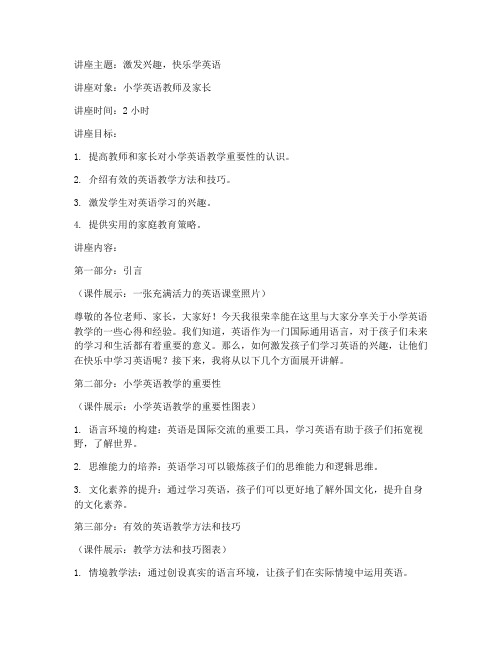
讲座主题:激发兴趣,快乐学英语讲座对象:小学英语教师及家长讲座时间:2小时讲座目标:1. 提高教师和家长对小学英语教学重要性的认识。
2. 介绍有效的英语教学方法和技巧。
3. 激发学生对英语学习的兴趣。
4. 提供实用的家庭教育策略。
讲座内容:第一部分:引言(课件展示:一张充满活力的英语课堂照片)尊敬的各位老师、家长,大家好!今天我很荣幸能在这里与大家分享关于小学英语教学的一些心得和经验。
我们知道,英语作为一门国际通用语言,对于孩子们未来的学习和生活都有着重要的意义。
那么,如何激发孩子们学习英语的兴趣,让他们在快乐中学习英语呢?接下来,我将从以下几个方面展开讲解。
第二部分:小学英语教学的重要性(课件展示:小学英语教学的重要性图表)1. 语言环境的构建:英语是国际交流的重要工具,学习英语有助于孩子们拓宽视野,了解世界。
2. 思维能力的培养:英语学习可以锻炼孩子们的思维能力和逻辑思维。
3. 文化素养的提升:通过学习英语,孩子们可以更好地了解外国文化,提升自身的文化素养。
第三部分:有效的英语教学方法和技巧(课件展示:教学方法和技巧图表)1. 情境教学法:通过创设真实的语言环境,让孩子们在实际情境中运用英语。
2. 游戏教学法:利用游戏激发学生的学习兴趣,提高课堂氛围。
3. 互动式教学:鼓励学生积极参与课堂活动,提高他们的口语表达能力。
4. 多媒体教学:运用多媒体技术,丰富教学内容,提高教学效果。
第四部分:激发学生英语学习兴趣的策略(课件展示:激发学习兴趣的策略图表)1. 故事教学:通过讲述有趣的英语故事,激发学生的学习兴趣。
2. 歌曲教学:利用英语歌曲,让孩子们在轻松愉快的氛围中学习英语。
3. 角色扮演:通过角色扮演,让孩子们在模仿中学习英语。
4. 英语角:组织英语角活动,让孩子们有机会与外教或其他学生交流。
第五部分:家庭教育策略(课件展示:家庭教育策略图表)1. 营造良好的家庭氛围:鼓励家长和孩子一起学习英语,共同进步。
小学英语专家讲座稿范文

小学英语专家讲座稿范文Learning English at the elementary level is a critical foundation for future academic and professional success. As an experienced English language educator, I am honored to share my insights and strategies for effectively teaching English to young students. In this lecture, I will discuss key principles and best practices that can help elementary school teachers foster strong English language skills in their pupils.One of the most important factors in elementary English education is creating a supportive and engaging learning environment. Young students need to feel comfortable taking risks and making mistakes as they develop their language abilities. Teachers should strive to cultivate a classroom atmosphere that is warm, encouraging, and free of excessive pressure or criticism. Providing plenty of opportunities for students to practice speaking, listening, reading, and writing in low-stakes, collaborative activities can go a long way in building their confidence and fluency.Another crucial element is ensuring lessons are age-appropriate andtailored to students' proficiency levels. Elementary school children have very different cognitive, social, and emotional needs compared to older students. Curriculum and instructional methods must be carefully designed to capture their short attention spans, capitalize on their natural curiosity, and scaffold learning in a step-by-step manner. For instance, relying heavily on visual aids, hands-on manipulatives, songs, and games can make language instruction more accessible and enjoyable for young learners.In addition, effective elementary English teaching requires a balanced, integrated approach that develops all four core language skills concurrently. It is not enough to solely focus on rote vocabulary memorization or grammar drills. Students need ample practice applying their knowledge in authentic, communicative contexts. Lessons should seamlessly incorporate listening, speaking, reading, and writing activities that reinforce and build upon one another. This holistic methodology helps students make meaningful connections and achieve well-rounded proficiency.Furthermore, elementary English teachers must be adept at fostering active student engagement. Passive, lecture-based instruction is generally ineffective for this age group. Instead, lessons should be interactive, dynamic, and centered around student participation. Strategies such as pair work, small group discussions, total physical response techniques, and project-based learning can encouragestudents to actively use the language. When students are actively involved in the learning process, they are more likely to stay motivated and make tangible progress.Equally important is the judicious use of the students' native language, when appropriate. While the target language should be the primary medium of instruction, judiciously incorporating the students' first language can serve as a valuable scaffold. This can involve providing translations, clarifying complex concepts, or checking for comprehension. Used strategically, the students' native language can help minimize frustration and facilitate smoother transitions as they acquire English.Finally, effective assessment and feedback are critical components of quality elementary English instruction. Teachers must employ a balanced approach that includes both formative and summative assessments. Formative assessments, such as informal observations, exit tickets, and learning journals, allow teachers to continuously monitor student progress and adjust lessons accordingly. Summative assessments, like unit tests and performance-based tasks, provide valuable data on students' overall language proficiency. Providing students with clear, constructive feedback on their strengths and areas for improvement is also essential for promoting learning and growth.In conclusion, teaching English effectively at the elementary level requires a multifaceted approach that addresses the unique needs and characteristics of young learners. By creating a supportive learning environment, delivering age-appropriate and skills-integrated lessons, fostering active engagement, judiciously using the students' native language, and implementing well-rounded assessment practices, elementary school teachers can lay a strong foundation for their students' lifelong English language development. Through the implementation of these research-based strategies, we can empower our youngest learners to become confident, competent users of the English language.。
小学英语教师专题讲座发言稿

小学英语教师专题讲座发言稿Ladies and Gentlemen,Today, I am honored to deliver a special lecture on the crucial role of English language teachers in primary schools. As we all know, the foundation of language learning is laid in the early years, and English, as an international language, holds immense importance in today's globalized world.Firstly, let's delve into the significance of English language learning for primary school students. English not only opens up a window to a vast array of knowledge and cultures but also equips students with essential skills for future success. It is through English that children can access the latest scientific advancements, understand diverse perspectives, and engage with the global community. Now, the question arises: how can teachers effectively facilitate this learning process? The answer lies in the pedagogy and teaching techniques employed. As primary school English teachers, we must create an immersive andengaging learning environment that encourages active participation and critical thinking.One effective approach is to use storytelling and role-playing to bring the language to life. By telling captivating stories or engaging in role-plays, students are able to connect with the language in a more meaningful way. This not only enhances their comprehension but also fosters a love for reading and speaking in English.Moreover, the use of multimedia and technology can greatly enhance the teaching-learning process. From interactive whiteboards to educational apps, these tools provide teachers with a plethora of resources to make lessons more engaging and dynamic.However, it is also essential to recognize that every child learns differently. Hence, teachers must employ differentiated teaching strategies to cater to the varying needs and learning styles of their students. This involves understanding each child's strengths and weaknesses, and providing tailored support and challenges accordingly.Furthermore, the role of teachers extends beyond the classroom. They are mentors, counselors, and role modelswho guide students in their personal and emotional growth.It is through their words and actions that students learn values, ethics, and life lessons that shape their character. In conclusion, the role of primary school English teachers is multifaceted and crucial. They are thearchitects of a child's linguistic and cognitive development, shaping their future potential and opening up limitless opportunities. By adopting innovative teaching techniques, utilizing technology, and providingpersonalized support, we can ensure that every child receives a high-quality English education that sets them on the path to success.各位同仁:今天,我很荣幸能够在这里就小学英语教师的重要作用这一主题发表专题讲座。
小学英语教师专题讲座发言稿

小学英语教师专题讲座发言稿Good morning, everyone. I'm pleased to be here today to share some ideas and strategies for teaching English toprimary school students.First and foremost, it's important to create a positive and encouraging learning environment for young learners. This includes using lots of visual aids, such as flashcards and pictures, to help students understand new vocabulary and concepts. It's also important to use a variety of activities and games to keep students engaged and motivated. For example, activities like role-plays, songs, and storytelling can make learning English fun and interactive.In addition, it's essential to provide plenty of opportunities for students to practice their English language skills. This can include pair work, group work, and whole-class discussions. By giving students the chance to speak andinteract in English, they can gain confidence and improve their fluency.Another important aspect of teaching English to primary school students is to focus on building their foundational language skills. This includes teaching phonics, reading comprehension, and basic grammar rules. By giving students a strong foundation in these areas, they will be better equipped to tackle more complex language tasks as they progress through their education.Furthermore, it's important to be mindful of the different learning styles and abilities of students in the classroom. As teachers, we should strive to provide differentiated instruction to meet the needs of all our students. This can include providing extra support for struggling students and offering extension activities for high-achieving students.Finally, I encourage all of you to be patient and supportive in your teaching. Learning a new language can be challenging, and it's important to celebrate small victories and progress along the way. By creating a supportive and positive learning environment, we can help our students develop a life-long love of the English language.In conclusion, teaching English to primary school students is a rewarding and important task. By creating a positive learning environment, focusing on foundational language skills, and providing differentiated instruction, we can help our students develop the English language skills they need to succeed. Thank you for your attention, and I wish you all the best in your teaching endeavors.。
小学英语专题讲座《如何提高小学生的英语听力水平》

小学英语专题讲座——如何提高小学生的英语听力水平听力,是语言学习的前提,它位于听、说、读、写四项技能之首,处于一个非常重要的地位。
小学英语检测中,听力分值大约占50%。
学生答题时常常会失分,怎样提高听力水平,笔者给大家几点建议:1.了解西方文化多种途径接触英语,让学生了解英语。
例如学生通过看原声电影,不仅丰富了业余生活,而且扩充了自己的英语词汇。
去年风靡全球的电影《冰雪奇缘》,很多学生喜欢里面的主题曲《Let it go》,在学唱的过程中,学生不仅提高了学习兴趣,也感受到英语的魅力。
有些学生平时爱看英语讲座或英语节目,如央视的动感英语和英语沙龙。
有些学生爱阅读,如《英语角》杂志,《时代英语报》等,通过这些途径去接触英语,不断地积累文化知识,才能更好、更快、更准地理解英语表达的意义。
2.积累基本词汇提高听力的基础是理解词汇。
词汇量的积累在英语学习中尤为重要。
学生除了掌握课本上的生词外,还可以通过课外阅读来扩大自己的词汇量。
如坚持阅读适合自己英语水平的文章,其内容可以是英语小故事、英语漫画、英语连环画,如the Ugly Ducking, Cinderella, the Wind and the Sun, the City Mouse and the Country Mouse等,循序渐进地积累词汇。
3.捕捉关键词句小学英语听力检测中常见题型有:听录音,选择所听到的内容,选择应答,图片排序,根据录音填空,对话理解、短文理解等。
不同题型都有相应的解题技巧,听力材料是对话的,一定听清开头,如:what, where, how, when, how many, how much, is, are, do, does等,这些词对应试很有帮助。
听力材料是填空的,学生可学会简写,如:“what”记录为“wt”, “which”记录为“wch”等。
4.学会听音辨音小学生需要不断提高模仿发音的能力。
听力培养从字母、单词、句子入手,培养“听”的好习惯,注意看老师的口型。
小学英语主题教研专题讲座《写作习惯培养》
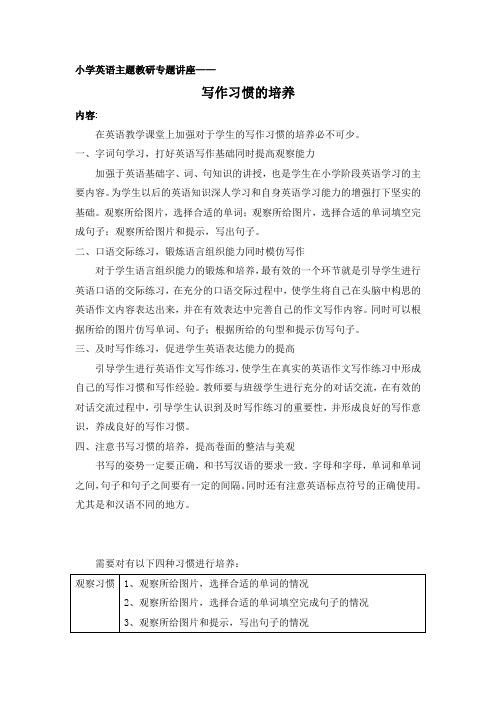
小学英语主题教研专题讲座——
写作习惯的培养
内容:
在英语教学课堂上加强对于学生的写作习惯的培养必不可少。
一、字词句学习,打好英语写作基础同时提高观察能力
加强于英语基础字、词、句知识的讲授,也是学生在小学阶段英语学习的主要内容。
为学生以后的英语知识深人学习和自身英语学习能力的增强打下坚实的基础。
观察所给图片,选择合适的单词;观察所给图片,选择合适的单词填空完成句子;观察所给图片和提示,写出句子。
二、口语交际练习,锻炼语言组织能力同时模仿写作
对于学生语言组织能力的锻炼和培养,最有效的一个环节就是引导学生进行英语口语的交际练习,在充分的口语交际过程中,使学生将自己在头脑中构思的英语作文内容表达出来,并在有效表达中完善自己的作文写作内容。
同时可以根据所给的图片仿写单词、句子;根据所给的句型和提示仿写句子。
三、及时写作练习,促进学生英语表达能力的提高
引导学生进行英语作文写作练习,使学生在真实的英语作文写作练习中形成自己的写作习惯和写作经验。
教师要与班级学生进行充分的对话交流,在有效的对话交流过程中,引导学生认识到及时写作练习的重要性,并形成良好的写作意识,养成良好的写作习惯。
四、注意书写习惯的培养,提高卷面的整洁与美观
书写的姿势一定要正确,和书写汉语的要求一致。
字母和字母,单词和单词之间,句子和句子之间要有一定的间隔。
同时还有注意英语标点符号的正确使用。
尤其是和汉语不同的地方。
需要对有以下四种习惯进行培养:。
小学英语老师开讲座发言稿范文
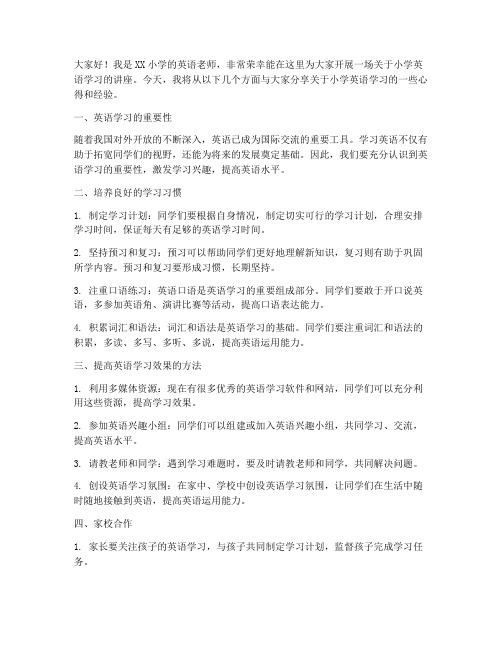
大家好!我是XX小学的英语老师,非常荣幸能在这里为大家开展一场关于小学英语学习的讲座。
今天,我将从以下几个方面与大家分享关于小学英语学习的一些心得和经验。
一、英语学习的重要性随着我国对外开放的不断深入,英语已成为国际交流的重要工具。
学习英语不仅有助于拓宽同学们的视野,还能为将来的发展奠定基础。
因此,我们要充分认识到英语学习的重要性,激发学习兴趣,提高英语水平。
二、培养良好的学习习惯1. 制定学习计划:同学们要根据自身情况,制定切实可行的学习计划,合理安排学习时间,保证每天有足够的英语学习时间。
2. 坚持预习和复习:预习可以帮助同学们更好地理解新知识,复习则有助于巩固所学内容。
预习和复习要形成习惯,长期坚持。
3. 注重口语练习:英语口语是英语学习的重要组成部分。
同学们要敢于开口说英语,多参加英语角、演讲比赛等活动,提高口语表达能力。
4. 积累词汇和语法:词汇和语法是英语学习的基础。
同学们要注重词汇和语法的积累,多读、多写、多听、多说,提高英语运用能力。
三、提高英语学习效果的方法1. 利用多媒体资源:现在有很多优秀的英语学习软件和网站,同学们可以充分利用这些资源,提高学习效果。
2. 参加英语兴趣小组:同学们可以组建或加入英语兴趣小组,共同学习、交流,提高英语水平。
3. 请教老师和同学:遇到学习难题时,要及时请教老师和同学,共同解决问题。
4. 创设英语学习氛围:在家中、学校中创设英语学习氛围,让同学们在生活中随时随地接触到英语,提高英语运用能力。
四、家校合作1. 家长要关注孩子的英语学习,与孩子共同制定学习计划,监督孩子完成学习任务。
2. 家长要鼓励孩子参加英语活动,为孩子提供良好的学习环境。
3. 家长要关注孩子的心理变化,及时与老师沟通,共同帮助孩子解决学习中的问题。
总之,小学英语学习是一个长期的过程,需要同学们、家长和老师的共同努力。
希望同学们能够珍惜学习机会,养成良好的学习习惯,提高英语水平,为未来的发展打下坚实基础。
小学生英语活动讲座稿

小学生英语活动讲座稿尊敬的各位家长、老师和同学们:大家好!很高兴能够在这个美好的时刻与大家相聚,共同探讨小学生英语研究的相关话题。
在此,我首先要感谢各位家长和老师对孩子的关爱与付出,也希望孩子们能够在今天的讲座中收获满满。
一、讲座背景随着全球化的加速,英语已经成为国际间最重要的交流工具之一。
在我国,英语教育也越来越受到重视,特别是对于小学生来说,英语研究不仅能够锻炼他们的语言能力,还能够开拓视野,培养他们的综合素质。
然而,在英语研究过程中,很多孩子会遇到各种困难,如研究兴趣不足、方法不当等。
为了帮助孩子们更好地研究英语,我们特举办此次讲座,分享一些实用的英语研究方法和技巧。
二、英语研究方法与技巧1. 培养研究兴趣培养学习兴趣兴趣是最好的老师。
我们要让孩子们认识到研究英语的重要性,让他们感受到英语的魅力。
可以通过观看英语动画片、听英文歌曲、阅读英语绘本等方式,激发孩子们的研究兴趣。
2. 创设语言环境创设语言环境语言的研究需要环境。
我们可以在家中布置一些英语元素,如英文标签、海报等,让孩子们在日常生活中自然地接触到英语。
此外,可以鼓励孩子们参加英语角、英语剧社等社交活动,与他人用英语交流,提高他们的口语能力。
3. 制定研究计划制定学习计划制定研究计划有助于提高研究效率。
家长可以帮助孩子制定合理的英语研究计划,包括每天的研究时间、研究内容等。
同时,要确保孩子按时完成研究任务,养成良好的研究惯。
4. 注重听说读写全面发展注重听说读写全面发展英语研究不仅仅是研究单词和语法,更重要的是提高听说读写的能力。
我们要注重培养孩子的听力和口语能力,让他们能够自信地用英语表达自己。
同时,阅读和写作也是非常重要的环节,通过大量阅读和写作,可以提高孩子的英语素养。
5. 适当辅导与鼓励适当辅导与鼓励家长和老师要关心孩子的研究进度,及时发现并解决他们在研究中遇到的问题。
同时,要给予孩子足够的鼓励和支持,让他们在研究过程中保持积极的心态。
小学英语讲座和发言稿范文

小学英语讲座和发言稿范文Good morning/afternoon, everyone.Today, I am here to talk to you about the importance of learning English at a young age. As we all know, English has become a global language and is widely used in various fields such as business, science, and technology. Therefore, it is crucial for children to start learning English at an early age to gain a competitive edge in their future careers.Learning English at a young age not only enhances children's communication skills but also broadens their horizons. It opens up a world of opportunities and allows them to connect with people from different cultures and backgrounds. Moreover, learning a new language at a young age has been shown to improve cognitive abilities and facilitate brain development.In addition, mastering English at a young age can boost children's confidence and self-esteem. It gives them a sense of accomplishment and empowers them to pursue their dreams and ambitions with confidence. Furthermore, it provides them with the tools they need to compete in a globalized world and thrive in the 21st century.To conclude, learning English at a young age is essential for children's future success. It equips them with valuable skills and knowledge that will benefit them throughout their lives. Therefore, as parents and educators, it is our responsibility to encourage and support children in their English learning journey.Thank you for listening. I hope that you will consider the importance of early English learning for your child.。
小学英语作文高分讲座稿
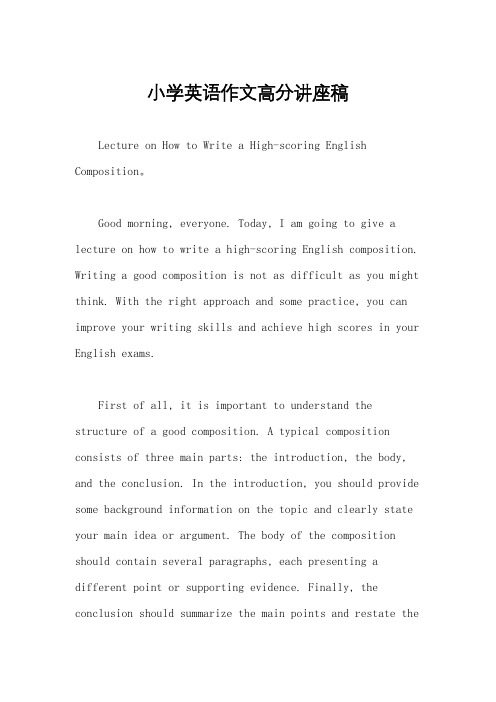
小学英语作文高分讲座稿Lecture on How to Write a High-scoring English Composition。
Good morning, everyone. Today, I am going to give a lecture on how to write a high-scoring English composition. Writing a good composition is not as difficult as you might think. With the right approach and some practice, you can improve your writing skills and achieve high scores in your English exams.First of all, it is important to understand the structure of a good composition. A typical composition consists of three main parts: the introduction, the body, and the conclusion. In the introduction, you should provide some background information on the topic and clearly state your main idea or argument. The body of the composition should contain several paragraphs, each presenting a different point or supporting evidence. Finally, the conclusion should summarize the main points and restate themain idea in a clear and concise manner.When writing a composition, it is crucial to use proper grammar and vocabulary. Avoid using slang or informal language, and pay attention to spelling and punctuation. Additionally, try to vary your sentence structure and use a variety of sentence types, such as simple, compound, and complex sentences. This will make your composition more interesting and engaging to read.Another important aspect of writing a high-scoring composition is to use good transitions between paragraphs and ideas. Transitions help to connect your ideas and make your composition flow smoothly. Some common transition words and phrases include "furthermore," "in addition," "however," and "on the other hand." Using these words and phrases will make your composition more cohesive and logical.Furthermore, it is essential to support your main idea with evidence and examples. This will make your composition more persuasive and convincing. You can use personalexperiences, facts, statistics, or quotes from experts to support your arguments. However, be careful not to overuse quotes, as it is important to express your own ideas and opinions in your composition.In addition to these tips, it is also important torevise and edit your composition carefully. After you have finished writing, take some time to review your work and make any necessary changes. Look for any grammatical errors, awkward phrasing, or unclear ideas, and make the necessary revisions. It is also helpful to ask a friend or teacher to read your composition and provide feedback.Finally, practice makes perfect. The more you practice writing compositions, the better you will become. Try to write on a variety of topics and in different styles to improve your writing skills. Additionally, reading good quality English compositions and literature can also help you improve your writing skills.In conclusion, writing a high-scoring English composition is not as difficult as it may seem. Byfollowing the tips I have outlined today, you can improve your writing skills and achieve high scores in your English exams. Remember to pay attention to the structure, grammar, vocabulary, transitions, and supporting evidence in your compositions, and don't forget to revise and practice. With some effort and practice, you can become a proficient and confident English writer. Thank you for listening, and I wish you all the best in your writing endeavors.。
小学英语主题教研讲座《作业设计策略》
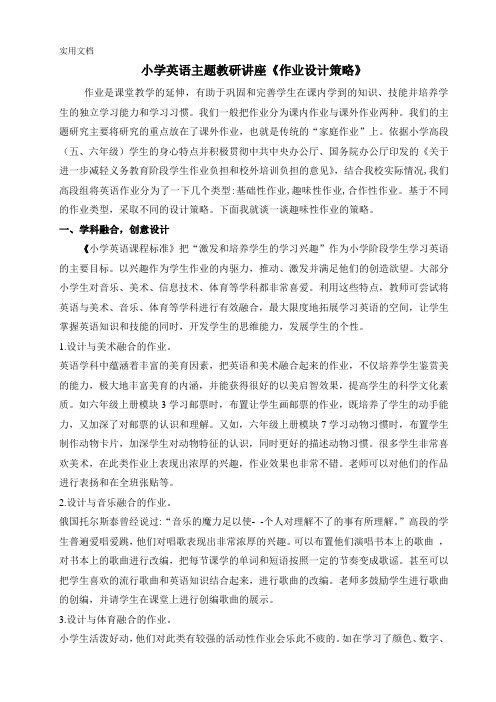
小学英语主题教研讲座《作业设计策略》作业是课堂教学的延伸,有助于巩固和完善学生在课内学到的知识、技能并培养学生的独立学习能力和学习习惯。
我们一般把作业分为课内作业与课外作业两种。
我们的主题研究主要将研究的重点放在了课外作业,也就是传统的“家庭作业”上。
依据小学高段(五、六年级)学生的身心特点并积极贯彻中共中央办公厅、国务院办公厅印发的《关于进一步减轻义务教育阶段学生作业负担和校外培训负担的意见》,结合我校实际情况,我们高段组将英语作业分为了一下几个类型:基础性作业,趣味性作业,合作性作业。
基于不同的作业类型,采取不同的设计策略。
下面我就谈一谈趣味性作业的策略。
一、学科融合,创意设计《小学英语课程标准》把“激发和培养学生的学习兴趣”作为小学阶段学生学习英语的主要目标。
以兴趣作为学生作业的内驱力,推动、激发并满足他们的创造欲望。
大部分小学生对音乐、美术、信息技术、体育等学科都非常喜爱。
利用这些特点,教师可尝试将英语与美术、音乐、体育等学科进行有效融合,最大限度地拓展学习英语的空间,让学生掌握英语知识和技能的同时,开发学生的思维能力,发展学生的个性。
1.设计与美术融合的作业。
英语学科中蕴涵着丰富的美育因素,把英语和美术融合起来的作业,不仅培养学生鉴赏美的能力,极大地丰富美育的内涵,并能获得很好的以美启智效果,提高学生的科学文化素质。
如六年级上册模块3学习邮票时,布置让学生画邮票的作业,既培养了学生的动手能力,又加深了对邮票的认识和理解。
又如,六年级上册模块7学习动物习惯时,布置学生制作动物卡片,加深学生对动物特征的认识,同时更好的描述动物习惯。
很多学生非常喜欢美术,在此类作业上表现出浓厚的兴趣,作业效果也非常不错。
老师可以对他们的作品进行表扬和在全班张贴等。
2.设计与音乐融合的作业。
俄国托尔斯泰曾经说过:“音乐的魔力足以使- -个人对理解不了的事有所理解。
”高段的学生普遍爱唱爱跳,他们对唱歌表现出非常浓厚的兴趣。
小学英语主题教研专题讲座《从词到段,克服写作困难》

小学英语主题教研专题讲座——从词到段,克服写作困难内容:小学英语写作教学是要帮助学生“把想说,说过的话写下来”。
根据话题、语境,写对每个词是正确写句子的基础;写对每个句子,是进行连贯书面表达的基础。
从写词、写句到写段,“写”的学习活动主要可以分为抄写、仿写、根据提示写三种类型。
在不同类型的学习活动中,“写”的要求各有侧重。
一、从词到句写正确小学阶段是英语学习的起步阶段,无论抄写,仿写,还是根据提示写,都要写出词汇、词法、句法等正确的语言形式,体现大小写、标点符号等正确书写的规范。
词、句、语法等的正确规范的抄写,仿写,为后续的英语写作学习奠定基础。
(一)归类抄写归类抄写在学习过程中能增加学生的抄写趣味,激发学生的学习动机,锻炼学生的思考能力。
如:根据自己对不同动物的认识,把单词抄在对应的圆圈中。
归类抄写适用于很多不同的主题。
如在“季节”的话题中,描述不同季节的气候特征,人的行为和喜好,有些内容在不同的季节会产生重复,就可以用上面的归类方式,圈的交叉部分记录共同的特征。
这样不仅巩固词汇、词组的学习,也为“说”提供内容。
(二)连词成句连词成句是一种比较常见的练习形式,主要是引导学生对所给信息进行阅读和分析,动用自己已有的认知能力,通过思考进行句子组成部分的逻辑排列,完成句子。
句子是表情达意的重要形式,它由若干单词有意义地组合而成。
单词好比语言的一个个零散的部件,只有组成了句子才有真正的意义。
连词成句这种练习形式涵盖了搭配、结构和语法三个方面的要求,指导连词成句的具体做法是非常关键的,提供有标点提示的连词成句练习可以帮助学生判断所要连成的句子是什么句型,是陈述句、疑问句还是感叹句。
如果是陈述句,那么要把“谁”放在第一位,如I、you、he、she或者其他人称、人名、物名;之后要找到动词,如eat、draw 等,这个动词可能是实义动词,也可能是be动词或系动词。
这个时候需要学生具备动词固定搭配的知识,如eat some bananas等。
- 1、下载文档前请自行甄别文档内容的完整性,平台不提供额外的编辑、内容补充、找答案等附加服务。
- 2、"仅部分预览"的文档,不可在线预览部分如存在完整性等问题,可反馈申请退款(可完整预览的文档不适用该条件!)。
- 3、如文档侵犯您的权益,请联系客服反馈,我们会尽快为您处理(人工客服工作时间:9:00-18:30)。
专题讲座稿
———小学英语“听做.说唱.玩演”教学法
大家都知道,英语是一门语言学科,是交际的工具,要使学生听、说、读、写全面发展。
教学就应面向实际,贴近生活,通过各种教学手段,发挥学生的主观能动性,使学生的精神、思维、身体等处于积极参与状态,进而提高学生的学习兴趣。
也就是说让学生在丰富多彩的活动中学习,在轻松愉快的氛围中锻炼。
下面,我想和大家一起梳理以下问题:
一、小学英语教学目的是什么?
1、激发学生学习英语的兴趣
2、培养积极的学习态度
3、建立初步的学习英语的自信心
4、培养一定的语感和良好的语音、语调基础
5、形成初步用英语进行简单日常交流的能力,为进一步学习打下基础
二、小学英语教学的目标是什么?
小学英语教学要创建以任务型活动课为主的教学模式。
教学重点是培养学生用语言进行交流的能力。
要充分利用教学资源,采用听、做、说、唱、玩、演的方式,鼓励学生积极参与,大胆表达,侧重提高小学生对语言的感受和初步用英语进行听、说、唱、演的能力。
在五、六年级,在进一步加强学生听说能力的同时,发展初步的读写能力,为进一步学习打好基础。
三、儿童语言学习要素有些什么?
1、有兴趣,常接触
2、有机会练习和使用
3、有各方面的鼓励
4、没有考试的压力
四、小学英语教学原则
五重:重兴趣、重参与、重实践、重语感、重能力。
五、小学英语教学模式
根据小学英语的特点,它的教学模式很多,我们今天重点要谈的是听做、说唱、玩演教学法。
遵循儿童心理和生理发展特点,教学要重体验、实践、参与与创造。
中低年级的英语教学主要以培养孩子们对英语的兴趣为主展开,要让孩子们在轻松的课堂环境下感受简单的英语,并尝试着用简单的英语口语进行日常的交流。
由于中低年级小学生的身心发展特点,他们活泼好动,而且容易分散注意力,从如何维持小学生的英语学习兴趣出发并进行正常的教学活动,这对英语老师的教学提出了一定的要求。
教师在教学设计时要根据所教班级的实
际情况,考虑这一学龄段学生的特点,有效地制定教学方案,从而实施课堂教学。
动作习得知识是当前学习理论中影响较大的一个。
美国语言学家乔母斯基(Noamchomsky)认为:人类天生就有获得语言的能力。
无论是儿童还是成人,他们学习第二语言所经历的过程与幼儿园习得第一语言的过程大体一致。
克拉申(krashen)在监察理论中也指出,在学习动机强、信心十足、轻松愉快、焦虑程度降低的情况下,学生就产生自然而然地学习语言的要求,而自然习得在外语学习中起主要作用,它是形成流利运用外语能力的关键途径。
我们说,在听做、说唱、玩演中学习外语能有效地巩固知识。
我国心理学工作者在1986年研究动作的遗忘进程时发现,动作的遗忘进程同艾宾浩斯的无意义音节的遗忘进程有很大区别。
研究表明,动作的保持率明显高于无意义音节的比率,也就是说动作不易遗忘。
学习中,语言、动作的迁移就是使学生语言的反应即动作,动作就意味着语言。
正如美国最先采取的听说法一样,用直观手段表现语言,小学低年级学生注意力集中时间短,但他们对新鲜事物具有较强的好奇心,而且活泼好动,模仿力强,勇于自我表现。
那么,听做、说唱、玩演多种活动方式,能够很好地促进学生全身心投入学习。
另外,我们每个人都是具有多种能力组合的个体,都有各自的智力强项和弱项,所以教师应根据学生智力组合的多样性实现最大程度的个性化教学。
英语教学应与每个学生的智力强项相结合,在展示强项,发展强项的过程中学习语言和运用语言,从而培养学生形成一定的综合语言运用能力,发展学生的多元智能,使语言学习取得良好的效果。
下面,我们就谈一些具体的做法。
听听做做开发身体运动智能,促进学生英语学习。
小学生生性好动,动手操作和表演使学生在动中玩,在乐中学,开发身体运动智能。
我们经常会运用Let’s do的形式充分促进学生运动智能的发展。
如:在学习颜色的时候有的老师设计这样的活动:Black, black. Stand up. Pink, pink. Sit down. Brown, brown. Touch the ground.通过听听,说说,动动,做做四步曲,学生很好地掌握了颜色的单词和表示日常动作的一些短语。
一举多得。
在学完1-10的数字后,可拿出篮球,边拍球边用英语数数,这样既玩了球,又复习了数字,一举两得。
再如,在学习Body时,可做Touch游戏,即让老师发指令,同学边做动作,边重复身体部位名称。
老师说:“Touch your mouth.”同学边指自己的嘴巴,边说:“Mouth, mouth, this is my mouth.”这样既锻炼了同学的听力,又加深了学生对于body词汇的记忆。
大家都知道TPR(全身反应教学法)是个很好的方法,边说边做。
比如,角色扮演,戏剧的即兴创作均能激发他们的学习欲望.如教师拿出一张卡片,上面写了一种东西,让这些学生看后把这种东西表演出来,然后全班同学猜老师的卡片上写了什么,或者卡片上写着老师让学生干的事,学生可把这件事表演出来,然后大家猜。
我们给学生创造表演的机会,于是他们在一边表演一边说台词一边表演一边说台词的过程中,便练习了语言知识。
